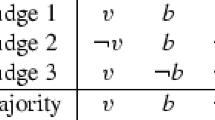Abstract
We can formalize judgments as (consistent sets of) logical formulas. Judgment aggregation deals with judgments of several agents, which need to be aggregated to a collective judgment. There are several logical formalizations of judgment aggregation. This paper focuses on a modal formalization which nicely expresses classical properties of judgment aggregation rules and famous results of social choice theory, like Arrow’s impossibility theorem. A natural deduction system for modal logic of judgment aggregation is presented in this paper. The system is sound and complete. As an example of derivation, a formal proof of Arrow’s impossibility theorem is given.
Similar content being viewed by others
References
Ågotnes, T., van der Hoek, W., & Wooldridge, M. (2011). On the logic of preference and judgment aggregation. Autonomous Agents and Multi-Agent Systems, 22, 4–30.
Arrow, K. (1951). Social choice and individual values. Amsterdam: Wiley.
Ciná, G. & Endriss, U. (2015). A syntactic proof of Arrow’s theorem in a modal logic of social choice functions. In Proceedings of the 14th international conference on autonomous agents and multiagent systems (AAMAS-2015).
Dietrich, F., & List, C. (2007). Arrow’s theorem in judgment aggregation. Social Choice and Welfare, 29, 19–33.
Dokow, E., & Holzman, R. (2010). Aggregation of binary evaluations. Journal of Economic Theory, 145, 495–511.
Endriss, U. (2011). Logic and social choice theory. In A. Gupta & J. van Benthem (Eds.), Logic and philosophy today. Marshalls: College Publications.
Geanakoplos, J. (2005). Three brief proofs of Arrow’s Impossibility Theorem. Economic Theory, 26, 211–215.
Grandi, U. & Endriss, U. (2011). Binary aggregation with integrity constraints. In Proceedings of the 22nd international joint conference on artificial intelligence (IJCAI-2011).
Grandi, U., & Endriss, U. (2013). First-order logic formalisation of impossibility theorems in preference aggregation. Journal of Philosophical Logic, 42, 595–618.
Hakli, R., & Negri, S. (2011). Reasoning about collectively accepted group beliefs. Journal of Philosophical Logic, 40(4), 531–555.
List, C., & Pettit, P. (2002). Aggregating sets of judgments: An impossibility result. Economics and Philosophy, 18, 89–110.
List, C., & Puppe, C. (2009). Judgment aggregation: a survey. In P. Anand, C. Puppe, & P. Pattanaik (Eds.), Handbook of rational and social choice. Oxford: Oxford University Press.
Porello, D. (2010). Ranking judgments in Arrow’s setting. Synthese, 173, 199–210.
Sen, A. (1986). Social choice theory. In K. Arrow & M. Intriligator (Eds.), Handbook of mathematical economics (Vol. 3). Amsterdam: North-Holland.
Tang, P., & Lin, F. (2009). Computer-aided proofs of Arrow’s and other impossibility theorems. Artificial Intelligence, 173, 1041–1053.
Troquard, N., van der Hoek, W., & Wooldridge, M. (2011). Reasoning about social choice functions. Journal of Philosophical Logic, 40, 473–498.
van Benthem, J., van Ditmarsch, H., van Eijck, J., & Jaspars, J. (2014). Logic in action. http://www.logicinaction.org/. Accessed 13 August 2015.
Author information
Authors and Affiliations
Corresponding author
Rights and permissions
About this article
Cite this article
Perkov, T. Natural Deduction for Modal Logic of Judgment Aggregation. J of Log Lang and Inf 25, 335–354 (2016). https://doi.org/10.1007/s10849-016-9235-x
Published:
Issue Date:
DOI: https://doi.org/10.1007/s10849-016-9235-x




